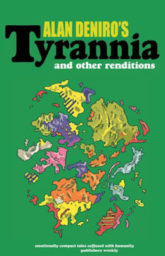I was reading Anya DeNiro’s Tyrannia and Other Renditions on the train last week, and my concentration was abruptly broken by a sudden pounding noise. If you live in a city, and you’re on the train every day, a there’s a part of you that lives in perpetual dread of the day the train finally derails or explodes or just stops and never starts again, the same way that drivers dread the day the screeching, failing brakes they hear are their own, or the car behind them. But the pounding wasn’t my death kindly stopping for me—it was a police officer, who had decided to hold the door of the train car, and bang on the car’s wall, and yell, all to wake a sleeping woman.
“You can’t do that here!” He yelled this into her ear, as I and the other commuters glared at him.
The woman was silent, under a blanket. She had a bag. Maybe she was homeless, maybe she was taking a nap on the way to the airport, but either way she wasn’t disturbing anyone. Either way she looked ashamed at being put on display. She pushed the blanket down and straightened up, and we all glared at the cop some more, and he left.
I went back to reading Tyrannia. Sometimes life is a little too on-the-nose for my taste, but it’s not like I can control it.
DeNiro’s book veers through many different definitions of the word tyranny—political, emotional, religious, cosmic—looking at the ways power and powerlessness shape our ends. They can jump nimbly from the loftiest ideas to the visceral in a few words—in the opening story, “Tyrannia”, we meet a dissident after his execution, as the birds and beetles sidle in from the outskirts of the mass grave to create new homes in the corpses. Then DeNiro takes us back a few months, to the dissident’s refusal to turn in his compatriots, his words, his hopes.
“Tyrannia” and “Tyrannia II” both weave in and out of human minds and those of animals, birds, stones, beetles, clouds…they are both fables with horrifying acts of violence on their edges. But by keeping the violence off to the side, DeNiro makes a larger point about the transience of human civilizations, and the impossibly large fact that human existence is an eye-blink, and that while torture and oppression are certainly horrible to those who live through them—not to mention those who do not—at the same time even the most heinous despot is destined to rot into nothing, just as those he oppresses.
“Rendition” begins in a world recognizable as our own. It deals with the way the theory and mechanization of tyranny can echo through an entire society, as in a college professor who literally wrote the book on torture suddenly being expected to answer for his writings. But in the act of torture, an innocent becomes a torturer, right? So who can draw the moral line when an attempt at justice inevitably makes a monster of the justice seeker?
“Plight of The Sycophant” and “Highly Responsive to Prayer” both delve into the tyranny that can come with religion. “Sycophant” edges into Biblical fantasy, while “Highly Responsive” gives us religion by way of post-George-Saunders dystopia. In the first, our narrator is a clerk at the last pawn shop before the waterfall—a mystical (not to mention misty) barrier between the ordinary world and the other world. The waterfall is patrolled by “angels” 7-8 foot tall creatures who wear ponchos and carry flying guns, and have absolute control over whether a person gets into the other world. The pawn shop does bang up business because generally, if a person is going into the other world, they’ll want to trade in as much stuff as possible…and once you go in, you never come back out. The narrator is content to watch the waterfall from afar until a woman named Lydia walks into his pawnshop with a proposition. “Highly Responsive to Prayers” gives us a Christian Capitalist society that could either be the best utopia ever or an absolute hell depending on your own proclivities. The Community, as its called, offers both vast malls (complete with a gun check!) and “prayer knots”—stations that allow you to pray while receiving visions of Land of Light, as a different group of angels patrol to make sure no unbelievers disturb you. Of course, there are no real unbelievers in the Community, but there are different levels of saved, and our narrator is a few levels below where he should be. The fascinating element here is the seamless way the story combines violence, shopping, and the particularly soporific brand of Christianity that promises surcease from pain without expecting any work or sacrifice on the believer’s part.
 In “Dancing in the House” a group of kids literally want to dance in a house. They break into a seemingly empty home and cue up some sweet Steely Dan, and naturally darkness ensues. Here the “tyranny” is class-based: the narrator and his friends are obviously lower class and poor, trying to borrow the sheen of the McMansions they break into. As the plot ensues, the narrator keeps returning to thoughts of his mother, whose big dream was to be a professional cheerleader. In only a few pages we get a pitch perfect sketch of a desperately poor group of people who are trying to buy moments of happiness through drugs and music—the kind of people who have cameos in Denis Johnson stories and Breaking Bad episodes, whose role in life is to serve as a punchline for other, more stable characters.
In “Dancing in the House” a group of kids literally want to dance in a house. They break into a seemingly empty home and cue up some sweet Steely Dan, and naturally darkness ensues. Here the “tyranny” is class-based: the narrator and his friends are obviously lower class and poor, trying to borrow the sheen of the McMansions they break into. As the plot ensues, the narrator keeps returning to thoughts of his mother, whose big dream was to be a professional cheerleader. In only a few pages we get a pitch perfect sketch of a desperately poor group of people who are trying to buy moments of happiness through drugs and music—the kind of people who have cameos in Denis Johnson stories and Breaking Bad episodes, whose role in life is to serve as a punchline for other, more stable characters.
The collection ends on “The Philip Sidney Game”, which I don’t want to say too much about, because it’s a delicate piece and I don’t want to spoil it. It’s an intricate puzzle box of a story, but it opens up in a way that confounded my expectations, and transformed it from a postmodern gimmick into a harrowing meditation on time and free will. DeNiro reminds us that time is the ultimate tyrant, and that whether Time’s court jester is fate or random chance, it’s kind of terrible to realize that we’re always, every moment, at the mercy of forces we can’t control.
This collection is slim but never slight, and just when you think DeNiro must have run out of renditions, they tilt the idea of tyranny just enough that each story feels new, unique, and important.
Anya DeNiro’s Tyrannia is available from Small Beer Press
Leah Schnelbach knows that as soon as this TBR Stack is defeated, another will rise in its place. Come give her reading suggestions on Twitter!










